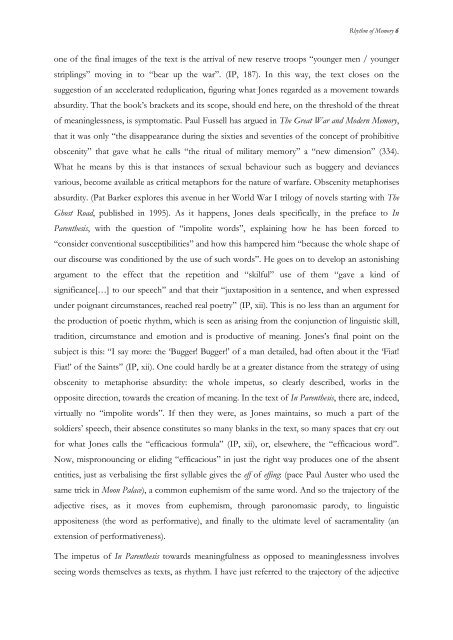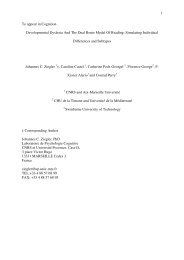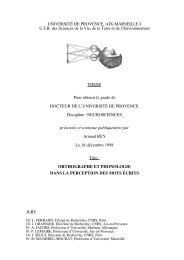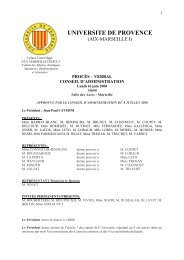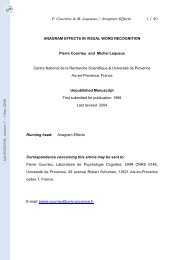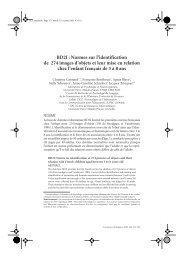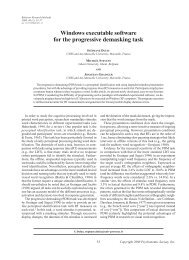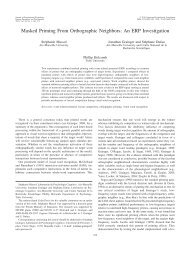The rhythm of memory: a reading of poetic rhythm in David Jones's ...
The rhythm of memory: a reading of poetic rhythm in David Jones's ...
The rhythm of memory: a reading of poetic rhythm in David Jones's ...
- No tags were found...
Create successful ePaper yourself
Turn your PDF publications into a flip-book with our unique Google optimized e-Paper software.
Rhythm <strong>of</strong> Memory 6one <strong>of</strong> the f<strong>in</strong>al images <strong>of</strong> the text is the arrival <strong>of</strong> new reserve troops “younger men / youngerstripl<strong>in</strong>gs” mov<strong>in</strong>g <strong>in</strong> to “bear up the war”. (IP, 187). In this way, the text closes on thesuggestion <strong>of</strong> an accelerated reduplication, figur<strong>in</strong>g what Jones regarded as a movement towardsabsurdity. That the book’s brackets and its scope, should end here, on the threshold <strong>of</strong> the threat<strong>of</strong> mean<strong>in</strong>glessness, is symptomatic. Paul Fussell has argued <strong>in</strong> <strong>The</strong> Great War and Modern Memory,that it was only “the disappearance dur<strong>in</strong>g the sixties and seventies <strong>of</strong> the concept <strong>of</strong> prohibitiveobscenity” that gave what he calls “the ritual <strong>of</strong> military <strong>memory</strong>” a “new dimension” (334).What he means by this is that <strong>in</strong>stances <strong>of</strong> sexual behaviour such as buggery and deviancesvarious, become available as critical metaphors for the nature <strong>of</strong> warfare. Obscenity metaphorisesabsurdity. (Pat Barker explores this avenue <strong>in</strong> her World War I trilogy <strong>of</strong> novels start<strong>in</strong>g with <strong>The</strong>Ghost Road, published <strong>in</strong> 1995). As it happens, Jones deals specifically, <strong>in</strong> the preface to InParenthesis, with the question <strong>of</strong> “impolite words”, expla<strong>in</strong><strong>in</strong>g how he has been forced to“consider conventional susceptibilities” and how this hampered him “because the whole shape <strong>of</strong>our discourse was conditioned by the use <strong>of</strong> such words”. He goes on to develop an astonish<strong>in</strong>gargument to the effect that the repetition and “skilful” use <strong>of</strong> them “gave a k<strong>in</strong>d <strong>of</strong>significance[…] to our speech” and that their “juxtaposition <strong>in</strong> a sentence, and when expressedunder poignant circumstances, reached real poetry” (IP, xii). This is no less than an argument forthe production <strong>of</strong> <strong>poetic</strong> <strong>rhythm</strong>, which is seen as aris<strong>in</strong>g from the conjunction <strong>of</strong> l<strong>in</strong>guistic skill,tradition, circumstance and emotion and is productive <strong>of</strong> mean<strong>in</strong>g. Jones’s f<strong>in</strong>al po<strong>in</strong>t on thesubject is this: “I say more: the ‘Bugger! Bugger!’ <strong>of</strong> a man detailed, had <strong>of</strong>ten about it the ‘Fiat!Fiat!’ <strong>of</strong> the Sa<strong>in</strong>ts” (IP, xii). One could hardly be at a greater distance from the strategy <strong>of</strong> us<strong>in</strong>gobscenity to metaphorise absurdity: the whole impetus, so clearly described, works <strong>in</strong> theopposite direction, towards the creation <strong>of</strong> mean<strong>in</strong>g. In the text <strong>of</strong> In Parenthesis, there are, <strong>in</strong>deed,virtually no “impolite words”. If then they were, as Jones ma<strong>in</strong>ta<strong>in</strong>s, so much a part <strong>of</strong> thesoldiers’ speech, their absence constitutes so many blanks <strong>in</strong> the text, so many spaces that cry outfor what Jones calls the “efficacious formula” (IP, xii), or, elsewhere, the “efficacious word”.Now, mispronounc<strong>in</strong>g or elid<strong>in</strong>g “efficacious” <strong>in</strong> just the right way produces one <strong>of</strong> the absententities, just as verbalis<strong>in</strong>g the first syllable gives the eff <strong>of</strong> eff<strong>in</strong>g: (pace Paul Auster who used thesame trick <strong>in</strong> Moon Palace), a common euphemism <strong>of</strong> the same word. And so the trajectory <strong>of</strong> theadjective rises, as it moves from euphemism, through paronomasic parody, to l<strong>in</strong>guisticappositeness (the word as performative), and f<strong>in</strong>ally to the ultimate level <strong>of</strong> sacramentality (anextension <strong>of</strong> performativeness).<strong>The</strong> impetus <strong>of</strong> In Parenthesis towards mean<strong>in</strong>gfulness as opposed to mean<strong>in</strong>glessness <strong>in</strong>volvessee<strong>in</strong>g words themselves as texts, as <strong>rhythm</strong>. I have just referred to the trajectory <strong>of</strong> the adjective


